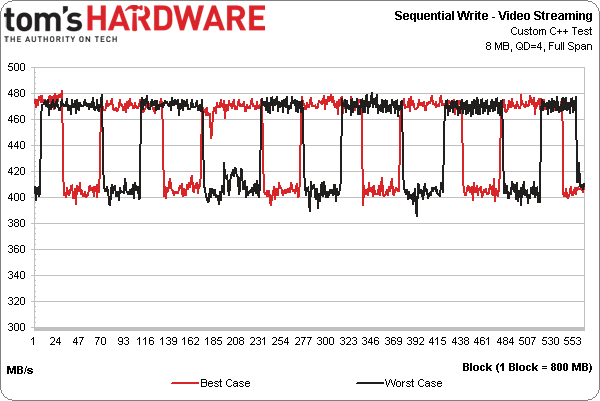The SSD DC S3500 Review: Intel's 6 Gb/s Controller And 20 nm NAND
As enterprise SSDs become more specialized and application-focused, Intel is hoping its SSD DC S3500 will strike a chord with customers looking for excellent read performance on a budget. We compare this drive to other notable contenders in its class.
Results: Enterprise Video Streaming Performance
Video streaming is a demanding workload within the enterprise space. Companies want more HD streams with higher bit-rates and no stuttering. A storage solution well-suited for enterprise-class video delivery has completely different capabilities than something designed for databases. At the end of the day, you're basically looking for exceptional large-block sequential write performance. You also need a high level of consistency that traditionally isn't seen from consumer SSDs. For a more in-depth analysis, take a look at page 10 of Intel SSD 910 Review: PCI Express-Based Enterprise Storage.
Once the drive is in a steady state, we write its entire capacity 100 times. We use 8 MB transfer sizes and a queue depth of four, recording timestamps for each individual write. The graph below reflects 100-point averaging, so that you can better visualize the results.
When we first saw the results of our streaming performance tests, we were shocked. In fact, we performed this test on multiple machines, behind HBAs, on different drives, and with different test software. No matter what we did, we always saw this oscillation.
Even though our overall average was ~430 MB/s, we had some wild swings between 400 and 475 MB/s. The problem with this behavior is that a good portion of the writes are at or below the rated speed of 410 MB/s. How does this translate to sustained performance?
| Threshold | Best-Case Buffer Size | Worst-Case Buffer Size |
|---|---|---|
| 375 MB/s | 11 MB | 17 MB |
| 400 MB/s | 23 MB | 31 MB |
| 410 MB/s | 162 MB | 172 MB |
| 420 MB/s | 492 MB | 771 MB |
| 430 MB/s | 1239 MB | 1614 MB |
Even though there are prolonged periods of performance well above this drive's specification, the dips below gate the SSD DC S3500's performance. But, even minimal amounts of software buffering should allow you achieve its stated performance. Just don't go much above, or you will pay the price very quickly.
Get Tom's Hardware's best news and in-depth reviews, straight to your inbox.
Current page: Results: Enterprise Video Streaming Performance
Prev Page Results: Sequential Performance Next Page SSD DC S3500: Not Quite An S3700 Or 600 Pro-
Mastle Hi, Think there's an error on page 1, $579 for 80GB drive......Surely won't be getting it at that price for my home build!Reply -
busuan Found myself suddenly losing interests in SATA SSDs after seeing the specs of PCIe SSD in the latest MBA refresh.Reply -
PapaCrazy An Intel 320 series SSD I put in my dad's computer just encountered the 8mb bug even though the firmware was updated with the "fixed" version. He uses the computer for business and I got him an Intel SSD thinking it'd be reliable. I think I'm gonna try Samsung next time around.Reply -
Evolution2001 Nitpicking here... but the article text is still wrong...or the math is. :pReply
''...we do know that the 800 GB model we're reviewing should run around $579. At ~$1.20/GB, ...''
800GB @ $1.20 = $960. -
drewriley Reply10952175 said:Nitpicking here... but the article text is still wrong...or the math is. :p
''...we do know that the 800 GB model we're reviewing should run around $579. At ~$1.20/GB, ...''
800GB @ $1.20 = $960.
Thanks, just can't seem to get the right combination of 4, 8 and 0. The 480GB version is $579 -
drewriley Reply10952165 said:An Intel 320 series SSD I put in my dad's computer just encountered the 8mb bug even though the firmware was updated with the "fixed" version. He uses the computer for business and I got him an Intel SSD thinking it'd be reliable. I think I'm gonna try Samsung next time around.
With the BAD_CTX_13X (8MB) failure, the fixed firmware fixed 'most' of them. The failure rates are quite low, especially after the FW 'fix', but if that one failure happens on the only drive you bought, it can really suck. As a consumer, I could care less if a million other people got a good SSD, if mine fails, I am upset. As an enterprise buyer, if one fails out a million, my company is throwing a party!
-
flong777 Why does Intel continue to release mediocre SSDs? Granted this performs middle of the pack but I just don't understand why a company with Intel's resources doesn't put out a top performer like the 840 Pro.Reply -
Grizely1 Reply10955531 said:Why does Intel continue to release mediocre SSDs? Granted this performs middle of the pack but I just don't understand why a company with Intel's resources doesn't put out a top performer like the 840 Pro.
Go back and read the article.
Or, learn the difference between consumer vs commercial. It's a DT (Data Center). -
flong777 Reply10959572 said:10955531 said:Why does Intel continue to release mediocre SSDs? Granted this performs middle of the pack but I just don't understand why a company with Intel's resources doesn't put out a top performer like the 840 Pro.
Go back and read the article.
Or, learn the difference between consumer vs commercial. It's a DT (Data Center).
Fair enough, I guess I should have been more clear. I don't understand why Intel is involved with so many mediocre SSDs - whether enterprise or consumer.
While I am not an enterprise user, I think I understand the basics. Enterprise SSDs are geared to handle heavy cues and write loads.
You have a point that it is not fair to compare enterprise with consumer - they are two different animals.
